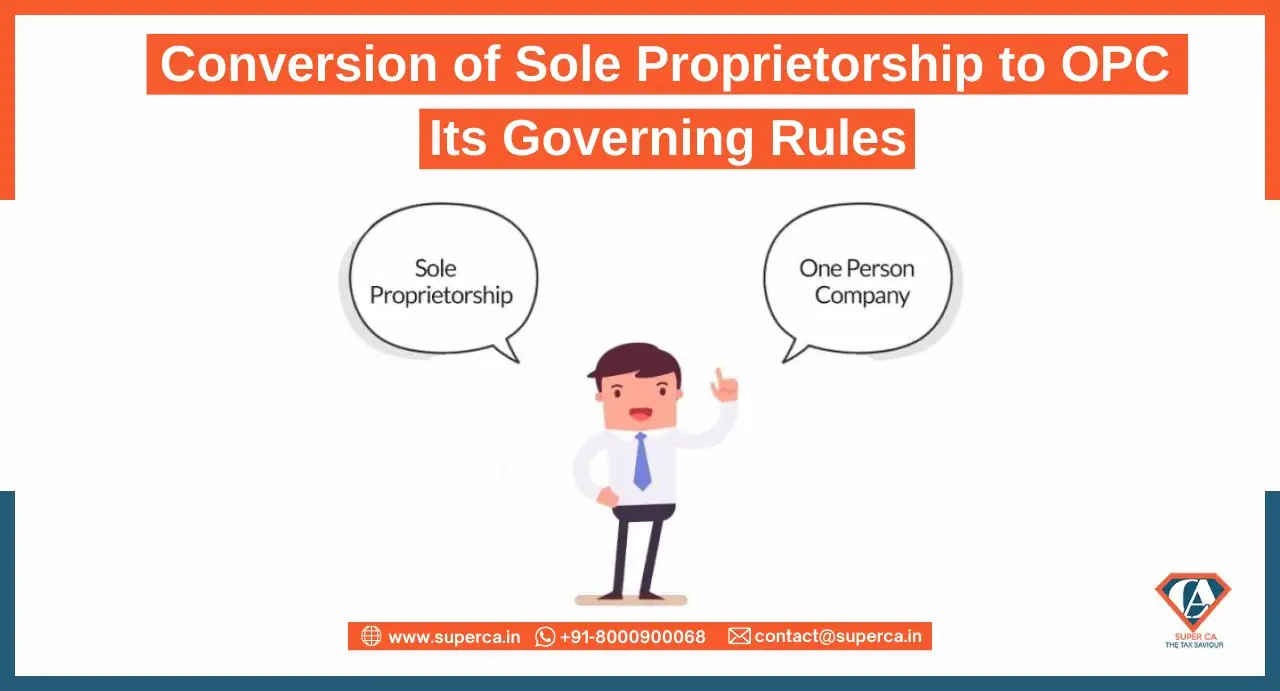Conversion of Sole Proprietorship to OPC and its Governing Rules
- Posted By SuperCA
- On 16 November

About
One Person Company and Sole Proprietorship are two different business structures & also are different in terms of their working but sometimes people get confused between them due to their similar sounding words.
Sole Proprietorship registration is a popular type of enrollment of unregistered business institution owned, managed, and operated by a single person. Sole proprietorship is the “One Man Business Entity”. All the investments for the business with sole proprietorship registration is done by the single proprietor who bears all the losses and enjoys all the profits. The overall control of the business as well as its management is in his hands. He can appoint individuals for conducting the business, but the ownership will rest solely with him.
Whereas one the other hand, One person company registration is an improved and better form of a sole proprietorship registration. One person companies are a great business organization structure for medium-sized businesses. The Company which has only one person as its member. It is a fusion of Sole-Proprietorship and Company form of business. In order to enable a person who is carrying on the business in the Sole-Proprietorship firm to enter into a corporate outline with relaxed or concessional requirements under the Act, the Companies Act 2013 had brought in the new concept of OPC.
This business structure gives the single promoter a full control over the company and at the same time limiting his liabilities to safeguard his personal assets. The owner of this company is a shareholder. Similar to Private Company, OPC may also appoint a distinct individual as director for its management. Appointment of a nominee is mandatory in case of OPC.
Since, OPC is an improved and better form of a sole proprietorship firm and thus conversion of firm with sole proprietorship registration into One Person Company is a good business decision.
Prerequisites of Converting Sole Proprietorship to One Person Company:
- An individual can form a company with one single member and one director. The director and member can be the same person but can be a member in only one OPC
- One shareholder must be a resident of India.
- It shall have a minimum of one director, Only individuals can be designated as directors.
- The minimum authorised & subscribed share capital capital of Rs.1 lakh is prescribed. Further, the name of the OPC should be unique and should not be similar to any existing company name or trademark.
- A person must be appointed as nominee.
- The name of the company shall be ending with the words ‘(OPC) Private Limited’
Procedure
The following procedure needs to be followed for the conversion of business with sole proprietorship registration to OPC -
Step 1 - Obtaining Director Identification and Digital Signature Certificate
Step 2 - Applying for name approval
The following step is to get the Company’s name approved. The name can be approved in the Form SPICe+ 32 application. Only one preferred name along with the significance of keeping that name can be given in the Form SPICe+ 32 application. In case the name gets rejected, another name can be submitted by applying another Form SPICe+ 32 application.The name of the company is to be ended with the words ‘(OPC) Private Limited’
Step 3 - Drafting Memorandum of Association (MoA) and Articles of Association (AoA) describing the objectives and the rules of the company which are to be submitted to the ROC
Step 4 -Submit all the necessary documents required and then apply for the incorporation of the company to the Ministry of Corporate Affairs (MCA). The forms to be submitted to the MCA are:
Required Documents
➤ Proof of Identity
- Proof of identity for Directors/Shareholder (Voter ID/Passport/Driving License)
- PAN Card for Indian Nationals /Passport for Foreign Nationals ( Both are Mandatory)
- Address proof of Directors and Shareholder (Out of Latest bank statement, telephone bill, mobile bill, electricity bill or gas bill should be submitted as a residence proof. Ensure that statement shouldn’t be more than 2 months old)
➤ Proof of Registered office
- Conveyance/ Lease deed/ etc. along with rent receipts (any one)
- Copy of the utility bills (Telephone/Gas/Electricity bill) (must not older than two months)
- If the registered office is rented, the rent agreement and a NOC from the landlord has to be submitted.
A Nominee has to be appointed as there is only one director and member. The consent of the Nominee is to be taken along with the PAN and Aadhar card in Form INC 3. The declaration and consent of the proposed Director is also taken in Form 9 and DIR 2 respectively. Apart from all, you need a declaration by a professional certifying that all the compliances are met.
Step 5 - The Registrar of Companies (ROC) will issue a Certificate of Incorporation upon verification of all documents.
Cessation
Both Sole Proprietorship and OPC are beneficial in their own domain. Both have their own merits and shortcomings. Hence, it solely depends upon the motive and objectives of the entrepreneur when it comes to converting a business with sole proprietorship registration to OPC. Individuals who want to start a business from home or on a premise with a minimum amount can opt for Sole proprietorship registration. But with time and after a decent growth, if you want to start a corporation with less compliance, then Converting it to One Person Company is the best choice for you.
In short, the choice of business structure varies from person to person and business to business depending upon their intention. On that account, the decision must be taken after careful consideration of all the factors involved and see if it genuinely brings about privileges intended.
It was the overall process of converting a business with sole proprietorship registration into a private limited company. It should also be noted that almost the same procedures mentioned above apply in other cases, where one legal entity converts into any other legal firm.





